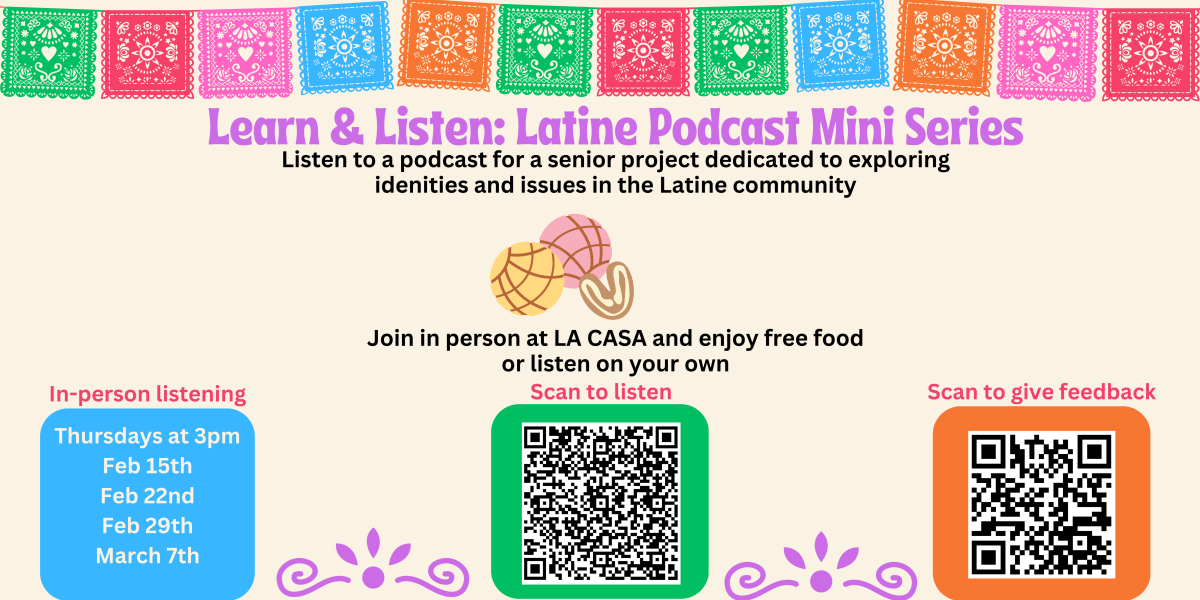For communication studies senior Liliana Rivas, she was unsure of what a senior project entailed, but knew she wanted to center it around Latine culture and the experiences of Latine people.
After Rivas took her COMS 460 undergraduate seminar, she decided to create an applied project. She wanted to provide a platform for people to speak on their own experiences and bring awareness to different issues that are often not discussed.
So, Rivas created a podcast called ‘Learn & Listen: A Latine Podcast Mini Series’.
She thought the best way to highlight the diverse identities, experiences and issues was to invite people to tell their story.
“I believe in the power of storytelling and believe that the way to give power to people is to let them tell their stories,” she said.
Rivas said the idea came about after going to the HSI symposium put on by the Office of University Diversity and Inclusion (OUDI). She felt empowered to support the Latine community after hearing multiple Latine faculty speak about their own experiences within academia. However, after hearing so many faculty and professional staff mention the logistics behind becoming an HSI, Rivas wished that she also got to hear students talk about their own experiences as well.
“I wanted to get students getting that experience to tell their own stories,” Rivas said.
With Cal Poly moving towards becoming a Hispanic Serving Institute (HSI), cultural engagement grants are being offered to students who demonstrate engagement within the community.
Rivas received this grant to create her podcast and host dialogues discussing issues surrounding the Latine community.
“When you have certain privileges you should use your platform to amplify those voices,” she said.
Creating the podcast
After a Turning Point USA speaker came to Cal Poly during fall quarter, Rivas wanted to highlight intersectionality within Latine culture and build a more inclusive community.
To prepare for the podcast, she did outside research on the different topics she wanted to discuss beforehand. These materials helped her facilitate discussions with her guests and were sourced from Rivas’ ethnic studies minor and communications major.
When choosing guests, Rivas pulled from her own friendships and relationships based on past conversations they had and because of their personal experiences and identities.
Rivas received much support from OUDI for her project. Diana Ortiz, the director of Programming, Communication and DEI education, helped Rivas pick up pan dulce for her listening parties.
“That office has been so supportive [and] it is so empowering that the office [consists] of women of color,” Rivas said.
When looking through past communication studies senior projects, she found very few centered around ethnicity and race. With the communication studies department also being predominantly white in her experience, Rivas wanted to make something impactful for her community.
Latine podcast mini-series
The podcast consists of five episodes centered around bringing awareness and creating dialogue about issues the Latine community faces, including sexuality and religion, being first generation college students, gender, indigeneity and being Latine in STEM.
Each episode was pre-recorded and premiered on Spotify every Thursday from Feb. 15 to March 7.
For instance, in one of the episodes, she brings on a biomedical junior Yesenia Ceja to discuss the lack of Latine representation in health care and health disparities within the community.
With the podcast, Rivas hopes that there can be a focus on bringing more awareness to how Latine individuals can receive adequate healthcare in the face of language barriers, health care providers lacking cultural awareness and media stereotypes hurting the Latine community.
This project also brought up a couple of challenges for Rivas in ensuring people were comfortable speaking about their experiences to a public audience. However, Rivas made her guests feel as comfortable as possible and checked in frequently if they wanted to continue with their discussion before filming.
“This project relies on collaboration from other people,” Rivas said.
Before recording episodes with her guests, she sent out her questions ahead of time to ensure that the guest is prepared and comfortable. Rivas also checked in with her guests before recording to ensure that they wanted to continue to be interviewed.
Partnerships and parties
Rivas has partnered with La Casa, a center for Latine students to build community and seek resources, to host live listening parties.
“Having it in La Casa, I want to engage in that dialogue and discussion within the community,” Rivas said.
Listeners are also provided with snacks, drinks and pan dulce.
Rivas had students approach her after listening sessions asking to be a part of the podcast episodes and if there will be more episodes outside of her senior project.
“If I decided to keep doing the podcast outside of my senior project it will just be more for the people and the culture…but right now it’s a podcast mini series, it’s not a full podcast,” she said.
Even if students may not resonate with every topic discussed, Rivas said she hopes students can find some takeaways and feel seen and heard.
“I hope students can listen to part of this podcast and see themselves in it,” she said.
Rivas said that for students who are not Latine, they can learn through unconscious biases about the people, culture and community because the Latine culture is intersectional and pulls from many different communities as well.
“We’re never going to grow and be inclusive if we can’t start these dialogues,” Rivas said.

